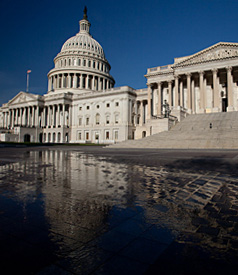Did you know that Truthout is a nonprofit and independently funded by readers like you? If you value what we do, please support our work with a donation.
Washington – Voters clearly want lawmakers to ease the nation’s unemployment pain, but a sharply divided Congress is still balking at extending jobless benefits for those out of work a long time.
Unless Congress acts by Nov. 30, an estimated 2 million people slated to receive extended benefits will not get them on time, if ever. And Congress is taking this week (Nov. 22-26) off for a Thanksgiving recess. Congress reconvenes on Nov. 29.
If lawmakers don’t extend the benefits, it will be the third time this year that they will have missed a deadline to do so, even though the nation’s unemployment rate, at 9.6 percent, hasn’t budged since May. Earlier this year, after Congress failed to extend benefits before deadlines, jobless workers got retroactive benefits once legislation was passed.
The average family receives about $290 a week from the benefits, which can last up to 99 weeks, depending on a state’s jobless rate. State employer taxes pay for the first 26 weeks. In weeks 27 to 99, a federal program funds most of the benefits; that’s what could be affected if Congress doesn’t act.
The new drama has two new wrinkles: Without congressional action, the jobless workers would be without the extra money during the holiday season — which would make the political stakes even higher.
Countering that sentiment, though, is that Republicans paid no political price for leading the effort to delay benefits earlier this year. Then, as now, they insisted that the benefits’ costs must be offset by spending cuts elsewhere in the budget. And voters rewarded their party on Nov. 2.
When the 112th Congress convenes in January, the GOP will take control of the House of Representatives after gaining 61 seats; they also added to their ranks in the Senate by gaining six seats, for a total of 47.
Polls leave no doubt that Americans’ top priority is job growth, yet last week, the first time Congress convened since the election, the House fell short on a vote to extend benefits, and the Senate didn’t try.
“Those who are spewing the hot air have a job, the security of a job and the security of health care,” said Sen. Bob Casey, D-Pa. “So they don’t really understand what real people are living through.”
Others insist that the nation can’t wait any longer to make tough budget choices. That’s why Sen. Olympia Snowe, R-Maine, who’s sided with Democrats in the past on this issue, was more circumspect this time.
“The pending expiration of unemployment benefits should be a signal and a wakeup call for Congress to finally focus like a laser,” she said, on developing “an environment that will provide certainty and stability with respect to tax and regulatory policies in order to foster economic growth and spur job creation.”
The House last week got a 258-154 majority for a $12.5 billion jobless-benefits extension through Feb. 28, but the measure failed because it was brought up under a special rule that required a two-thirds majority of those voting, or 275 votes, for passage.
Many Republicans saw the vote as a cynical Democratic ploy.
“Are you listening to the American people?” asked Rep. Charles Boustany, Jr., R-La., whom he said had sent a message in the elections that they want more fiscal responsibility.
Do you like this? Click here to get Truthout stories sent to your inbox every day – free.
“The fact is that we can both provide this help and pay for it by cutting less effective stimulus spending,” he said, citing one GOP plan to pay for the jobless aid.
Democrats countered that the nation is experiencing a true emergency, and this was no time to quibble over spending offsets.
“Any family receiving unemployment insurance would tell you that these benefits do not provide for a luxurious lifestyle without financial worries,” said Rep. Betty McCollum, D-Minn. “These same families would tell you that without these benefits, they would lose their home, lose their car and lose the ability to feed their children.”
The National Employment Law Project, which studies jobless trends, estimates that the benefits cover about half an average family’s routine living expenses. That family spent about $1,408 a month on housing, $531 on food and $638 on transportation, a total of $2,577_ but they’re getting $1,257 monthly in jobless aid.
The hardest hit state would be California, where about 410,000 people face a cutoff, followed by New York, Pennsylvania, Texas and Illinois.
Democrats see Republican hypocrisy at work. Major Bush-era tax cuts expire on Dec. 31, and most Democrats want to continue only those for individuals earning less than $200,000 a year and joint filers making less than $250,000.
Most Republicans want all tax cuts extended, including for those making more than $250,000. That would add an estimated $700 billion to the deficit during the next 10 years.
“The same Republicans who want to increase our deficit by extending massive tax breaks for the wealthiest Americans were willing to leave average Americans to fend for themselves,” charged Rep. Corrine Brown, D-Fla.
The battle resumes the week of Nov. 29.
ON THE WEB
National Employment Law Project jobless report
Wall Street Journal Q&A on benefits
Media that fights fascism
Truthout is funded almost entirely by readers — that’s why we can speak truth to power and cut against the mainstream narrative. But independent journalists at Truthout face mounting political repression under Trump.
We rely on your support to survive McCarthyist censorship. Please make a tax-deductible one-time or monthly donation.
